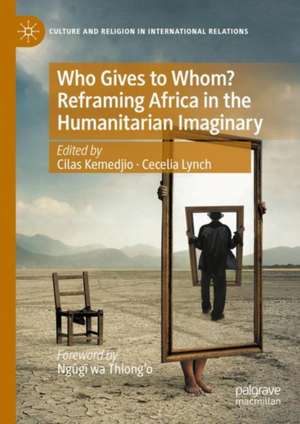Who Gives to Whom? Reframing Africa in the Humanitarian Imaginary: Culture and Religion in International Relations
Editat de Cilas Kemedjio, Cecelia Lynchen Limba Engleză Hardback – 20 mar 2024
Din seria Culture and Religion in International Relations
-
 Preț: 299.79 lei
Preț: 299.79 lei - 9%
 Preț: 623.33 lei
Preț: 623.33 lei -
 Preț: 310.74 lei
Preț: 310.74 lei - 20%
 Preț: 693.20 lei
Preț: 693.20 lei - 15%
 Preț: 640.88 lei
Preț: 640.88 lei -
 Preț: 383.93 lei
Preț: 383.93 lei - 15%
 Preț: 641.03 lei
Preț: 641.03 lei -
 Preț: 393.74 lei
Preț: 393.74 lei -
 Preț: 389.11 lei
Preț: 389.11 lei -
 Preț: 391.99 lei
Preț: 391.99 lei -
 Preț: 387.75 lei
Preț: 387.75 lei - 18%
 Preț: 730.02 lei
Preț: 730.02 lei -
 Preț: 387.75 lei
Preț: 387.75 lei -
 Preț: 389.70 lei
Preț: 389.70 lei - 15%
 Preț: 642.51 lei
Preț: 642.51 lei -
 Preț: 390.63 lei
Preț: 390.63 lei -
 Preț: 390.63 lei
Preț: 390.63 lei -
 Preț: 385.62 lei
Preț: 385.62 lei - 18%
 Preț: 886.12 lei
Preț: 886.12 lei
Preț: 747.63 lei
Preț vechi: 821.57 lei
-9% Nou
Puncte Express: 1121
Preț estimativ în valută:
143.06€ • 149.67$ • 118.84£
143.06€ • 149.67$ • 118.84£
Carte tipărită la comandă
Livrare economică 31 martie-05 aprilie
Preluare comenzi: 021 569.72.76
Specificații
ISBN-13: 9783031465529
ISBN-10: 3031465520
Ilustrații: XVII, 257 p. 8 illus.
Dimensiuni: 148 x 210 mm
Greutate: 0.48 kg
Ediția:2024
Editura: Springer Nature Switzerland
Colecția Palgrave Macmillan
Seria Culture and Religion in International Relations
Locul publicării:Cham, Switzerland
ISBN-10: 3031465520
Ilustrații: XVII, 257 p. 8 illus.
Dimensiuni: 148 x 210 mm
Greutate: 0.48 kg
Ediția:2024
Editura: Springer Nature Switzerland
Colecția Palgrave Macmillan
Seria Culture and Religion in International Relations
Locul publicării:Cham, Switzerland
Cuprins
Chapter 1: Reading Humanitarianism Critically.- Chapter 2. The Humanitarian Misunderstanding in the Postcolonial Humanitarian African Imagination.- Chapter 3. Extractive Salvation: Zoe’s Ark and the Ethic of Humanitarianism in Africa.- Chapter 4: Historical Roots of South African Ambivalence Toward “Africa”.- Chapter 5. Joseph Kony, Invisible Children, and Military Humanitarianism in the Northern Uganda Conflict.- Chapter 6: Engendering Care Revisited: Decolonizing Global Health and Dismantling Gender Stereotypes in HIV Care in Africa.- Chapter 7: How West African Women “Save” the Women, Peace, and Security Agenda.- Chapter 8: ‘Trust no one’: The logics of microfinance, depending on whom you ask.- Chapter 9. Toxic Scavenging in the Digital Divide.- Chapter 10. COVID-19 and the African Disaster that Wasn’t.- Chapter 11: Taking, Giving, Repairing and Reversing.- Chapter 12. The Last Word: Funtumfunafu, Denkyemfunafu: The Individual, the Community Reciprocity and Grace.
Notă biografică
Cilas Kemedjio is Professor of Francophone African and Caribbean literary and cultural studies at the University of Rochester, USA.
Cecelia Lynch is Professor of Political Science at the University of California, Irvine, USA.
Textul de pe ultima copertă
In this innovative volume, experts from international relations, anthropology, sociology, global public health, postcolonial African literature, and gender studies, take up Ngūgī wa Thiong’o’s challenge to see how Africa gives to the west instead of the reverse. Humanitarian assumptions are challenged by unpacking critical legacies from colonial and missionary genealogies to today’s global networks of nongovernmental organizations (NGOs). Who Gives to Whom: Reframing Africa in the Humanitarian Imaginary is a decolonial gesture that builds onNgūgī’s work as well as that of pan-Africanist and intersectional feminist scholars. Contributions range from assessing the impact of historical legacies of colonialism on gender, religious/secular attempts at “saving” Africans to (South) African unrealized project to reconfigure foreign policy frameworks shaped by apartheid. Case studies of “silver bullet” solutions focus on the incorporation of women in peacebuilding, microfinance, and e-waste disposal, to argue that humanitarian interventions continue to mask ongoing forms of despoiling African well-being while shortchanging intersectional African forms of agency.
Cilas Kemedjio is Professor of Francophone African and Caribbean literary and cultural studies at the University of Rochester, USA.
Cecelia Lynch is Professor of Political Science at the University of California, Irvine, USA.
Caracteristici
Takes up Ngūgī wa Thiong’o’s challenge to see how Africa gives to the west instead of the reverse Unpacks critical legacies from colonial and missionary genealogies to nongovernmental organizations Argues that humanitarian interventions continue to mask ongoing forms of despoiling African well-being
